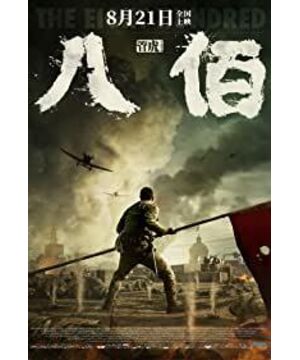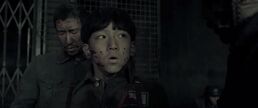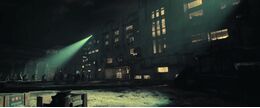Unlike "Operation Red Sea" or "Wolf Warrior 2" and other main theme films under the commercial logic, "Eight Hundred" is a brand-new form of image/ideological inquiry mechanism, and it is destined to be a film that is exposed to the flames of war. The film, since its birth, has been bombarded by various internal and external forces, assembling images into a kind of war machine, preset, modified and watched.
one. Four Lines Warehouse: Siege of War Games
"Eight Hundred" opens with an old voice in Shanghai dialect, "When I was seven years old...I don't know what happened, I only know that the fermented rice balls over there are very delicious..." Her words were recalled. A memory myth that is inseparable from Shanghai’s regional characteristics, originating from external viewing, expresses the interior of the warehouse as an inaccessible enchantment space, and can only encounter the return of its material shell and historical stand-in.
However, as a war film with the theme of the theme, this natural and devout awe is anti-film ontology . When these words are spoken, what appears on the screen is not an image, but an empty black screen and actors. List of people, as a pure audiovisual with no imagery anchored. All images must confront Sontag's curse: how can we avoid being insensitive to the suffering (or sense of community) of others in the face of the "hyperreal" qualities of photography and film?
Therefore, whether it is an image of a commercial or ideological inquiring machine, "Eight Hundred" must destroy this forbidden area of viewing, and must seamlessly connect this sound with the reconstructed image. The four-line warehouse in the digital image replaced, or tampered with, the four-line warehouse in history/memory. Historical images, falsified historical images, and ongoing events fight and race against each other in the film space.
In the four-line warehouse, which is a film space, the identity gradually becomes invalid, and the individual identity and the regional characteristics of "Shanghai" as a city give way to a larger imaginary community, and the "invalid" history of the National Government and Western colonists is suspended. But at the same time, it is also a space of miscellaneous languages, full of accents from Shandong, Hubei, Northeast and other places. The viewer can identify himself on the screen by the degree of deviation from the "official" pronunciation.
Main theme, or broadly speaking, a film that is intensely ideologically inquiring can be divided into two categories: technical, mythological, hypnotic through the illusion of coherence, and emotional technology. To achieve discipline, soothe. The other is through "audio-visual national (community)ism". Its alias is "speed nationalism", which means that the invocation must be carried out with the help of imbalance and vertigo, and the attraction and kinematics of the technique must be invoked. Gance chose the technique of fusion, and in the case of Eisenstein, it is between montage. tension movement.
"Eight Hundred" is similar to "1917", both of which are reconstructed in the historical space of IMAX's digital miracle. In the film, we can find the third-person tracking shot, in the scope, or the image in the gas mask of "Xiao Hubei", the sound of breathing. In other words, surprisingly isomorphic to VR games, arcade games or FPS. The days used for time division have become several levels of the game, in the mode of broadcast + game + broadcast, all plots and psychology are flattened, and the depth is lost. As a kind of perceptual logistics of play/view, it is a game. Awareness training for wars that are coming, or never come.
two. Towards the Concession: Eight Hundred Heroes Escape From Image Hell
The war of the Sixing Warehouse that broke out in 1937 was a strange war, a visual war, a movie war , and it kept returning in the history of movies. In 1938, only one year after the end, Ying Yun Wei and Lu Si completed their respective "Eight Hundred Heroes", and the faked "real-time" war mobilization was performed. In 1975, Ding Shanxi's "Eight Hundred Heroes" was a policy-oriented "military education film" in a specific period of Taiwanese film. Behind the melodrama-style emotional discipline technique, was the confirmation of the flag and the ideology behind it. Just as the lone army of 335 people in this war was propaganda and revised as "Eight Hundred Heroes", in the film military-industrial complex of mobilization, deception and deterrence, this war was constantly revised and written into a specific ideology, as Audience, all you need to do is watch, For your eyes only.
At the opening of the "Second Day" of "Eight Hundreds", a camera pulled backwards swept across the ruined city of Shanghai, the four-line warehouse, and finally, the panoramic view of the concession and the airship being observed above. In the 20-second shot composed of digital technology, the relationship of watching/being watched will be constructed like a meta-movie. The banks of the Suzhou River have become a theater-like space. In addition to the games staged at the Sixing Warehouse, the concession that maintains an absolutely safe distance from the war scene is a mirror image of the auditorium. In this, a secret "localization" movement is going on, prompting the "voice on the other side" from The opera representing the West gradually became Guan Yu and Zhao Zilong on the Peking Opera stage. In the suspended colonial history, people from the "local" are taking back the quasi-Western colony through deposition, and identifying with the four-line warehouse as the screen through their own mythology.
However, "Eight Hundred" also generates a kind of viewing from the inside of the screen, and "inquiry" must make these characters continue to be surrounded and disciplined by the movie mirror. The Japanese army behind the sniper mirror is dormant in the uncertain space outside the screen and the audience. The four-line warehouse is suspended by the surrounding space. The warehouse as the only physical space is transformed into a "panoramic open-view prison" of images. Disciplinary power comes not only from the enemy's sights, but also from the cameras of foreign journalists in the leased area, as well as the images "shot" by journalists who have sneaked into the warehouse, summoning an implicit "audience" in a larger international context— - Conference in Brussels.
To rush to the concession on the other side of the "Trash Bridge" in the dense block of artillery/lights means a process of refusing to counterpoint, trying to escape from the historical discipline of the eight hundred warriors from the pseudo-historical image hell, rushing to those who are hypnotized viewers, as well as cameras or binoculars in the hands of foreign journalists.
This movement was finally blocked by the disciplinary power of the video. In the series of slow-motion images at the end of the collective figures of the bridge fighters and the outstretched hands of the people, there is a barrier formed of tears, with collective Historical theology washed away the last pathway to the screen.
View more about The Eight Hundred reviews











